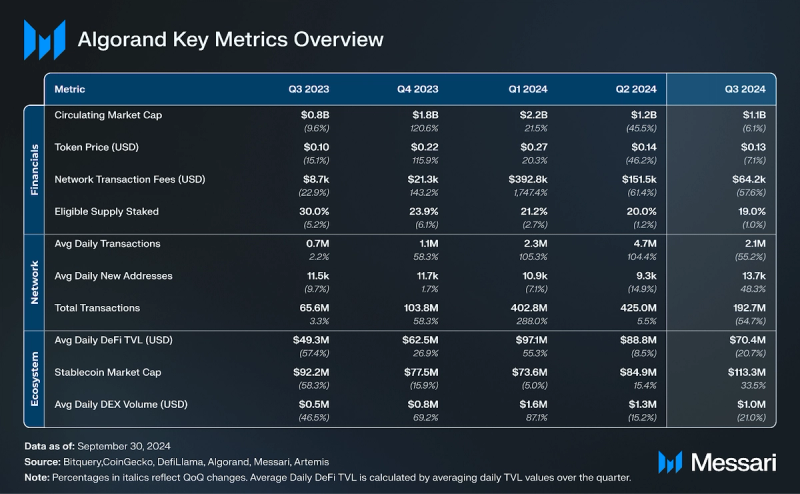Key Insights
- New addresses on Algorand grew by 63% QoQ, from 0.8 million to 1.3 million, driven by the Coinbase Learning Rewards program.
- Algorand’s DeFi TVL increased by 12% QoQ, rising from $173 million to $194 million, primarily due to activity on leading protocols.
- The stablecoin market cap on Algorand grew by 34% QoQ, driven by a 66% increase in USDC, which now holds 97% of Algorand’s stablecoin market.
- Network transaction fees decreased by 58% QoQ to $64,000, though it achieved 638% YoY growth. Average daily transactions fell 55% to 2 million, influenced by reduced event-driven activity and a 7% decline in ALGO price.
- The xGov program allocated 22.5 million ALGO in Q3 to support targeted DeFi projects and community governance.
Primer
Algorand (ALGO) is a smart contract platform using a Pure Proof-of-Stake (PPoS) consensus mechanism. The protocol was founded by Turing award-winning computer scientist Silvio Micali, also known for co-inventing zero-knowledge proofs, Verifiable Random Functions (VRF), and probabilistic encryption. Unlike other PoS smart contract protocols, Algorand currently does not reward nodes that participate in consensus, nor does it include a staking lockup or slashing mechanism. However, Algorand plans to incentivize consensus in the future. Similar to relying on stake weight in consensus, Algorand PPoS randomly selects consensus nodes based on their ALGO balances using a Verifiable Random Function (VRF), where having a larger balance increases the holder’s chance of selection. Algorand’s smart contract execution layer is powered by the Algorand Virtual Machine (AVM). Algorand supports smart contract development in Python as well as other community-developed languages. Algorand Technologies leads development, while the Algorand Foundation, a not-for-profit, supports governance, ecosystem funding, and community-driven development.
Website / X (Twitter) / Discord
Key Metrics
Performance Analysis
Network Transactions
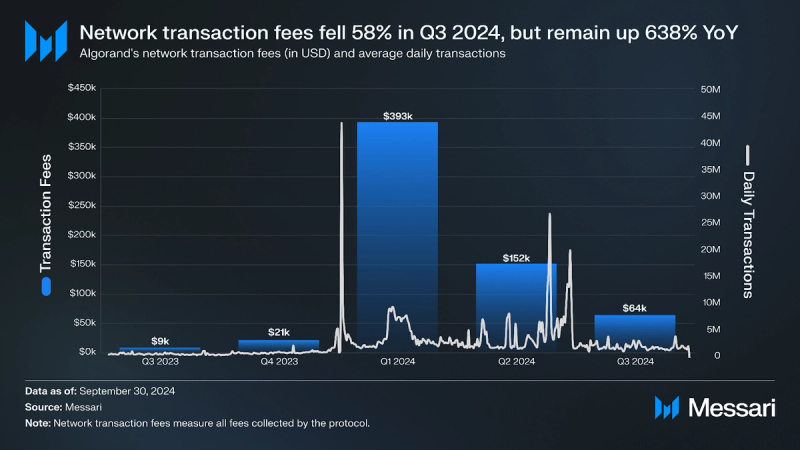
Total protocol revenue, which includes all collected fees from the network transactions, fell 58% QoQ from $152,000 to $64,000. Despite this quarterly decline, network transaction fees showed a high YoY growth of 638%, up from $9,000 in Q3 2023. This quarterly dip likely reflects a shift from the high-incentive activities of Q2 to more organic activity and regular transaction fees, rather than event-driven spikes.
Additionally, ALGO’s price declined 7% QoQ, from $0.14 to $0.13, while the circulating market cap dropped 6%, from $1.2 billion to $1.1 billion, potentially contributing to the decrease in transaction fees. Consistent with the decline in transaction fees, average daily transactions also dropped 55% QoQ, from 5 million to 2 million.
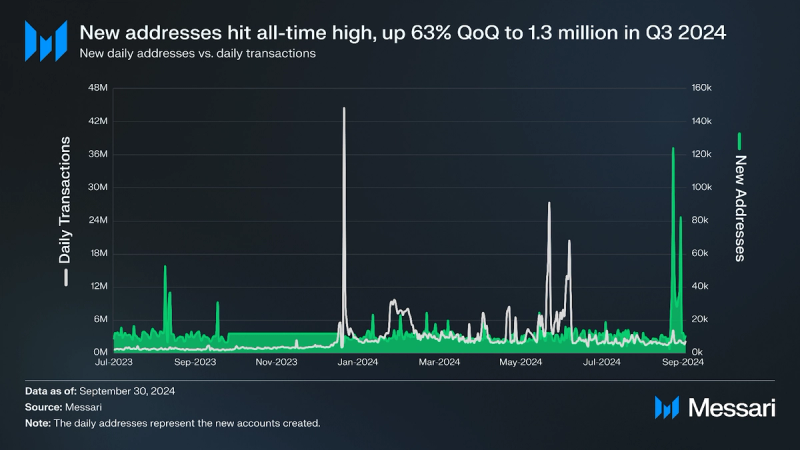
Despite declines in transactions and network fees collected, total new addresses grew by 63% QoQ, rising from 0.8 million to 1.3 million. This growth likely reflects Algorand’s engagement efforts, including partnerships and regional expansions such as education programs in Nigeria and India, as well as developer initiatives like the Algorand Incubator and regional bootcamps. Additionally, Algorand’s collaboration with Coinbase in September 2024 boosted engagement through educational quests on Coinbase Learning Rewards, offering up to $20 in incentives for exploring dApps like Pera Wallet, Tinyman, and Folks Finance. This partnership likely contributed to the surge in new addresses, resulting in record-high account creations of 124,000 on September 20 and 82,000 on September 26.
Staked ALGO
Staking ALGO for governance is different from most other chains. First, users must commit a certain amount to governance. If their ALGO balance falls below their commitment, then their entire stake becomes ineligible. Instead of directly participating in governance through the Algorand Foundation’s interface, users can also participate via Folks Finance’s Liquid Governance program, Algorand’s largest DeFi protocol. Its Liquid Governance program enables users to participate in governance by staking (not committing) ALGO in exchange for gALGO, a liquid governance token.
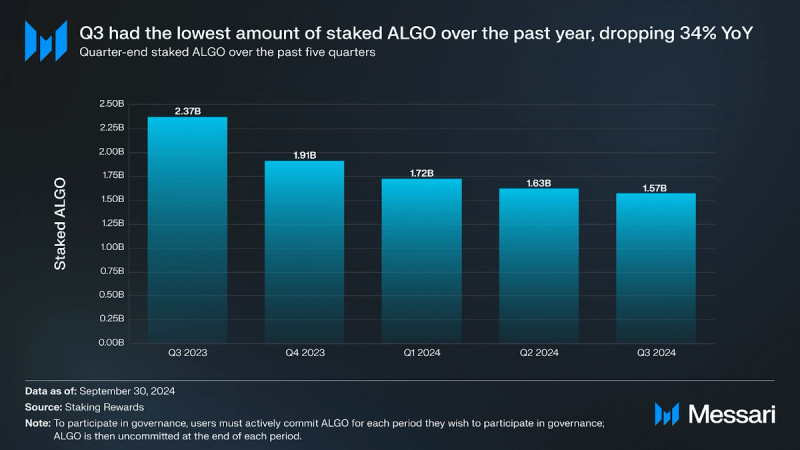
In Q3 2024, the amount of staked ALGO on Algorand fell by 34% YoY and 3% QoQ, reaching its lowest level in a year at 1.57 billion ALGO staked. This downturn can be partially attributed to the diminishing rewards allocated per governance period. The percentage of eligible Algorand supply being staked decreased by 1% QoQ, now standing at 19%. Meanwhile, Algorand’s circulating supply increased by 1.2%, reaching 8.3 billion ALGO. For more context, governance participants were awarded 42 million ALGO in Q3 2023; however, this figure has since dropped to only 17 million ALGO in Q3 2024.
Stablecoins
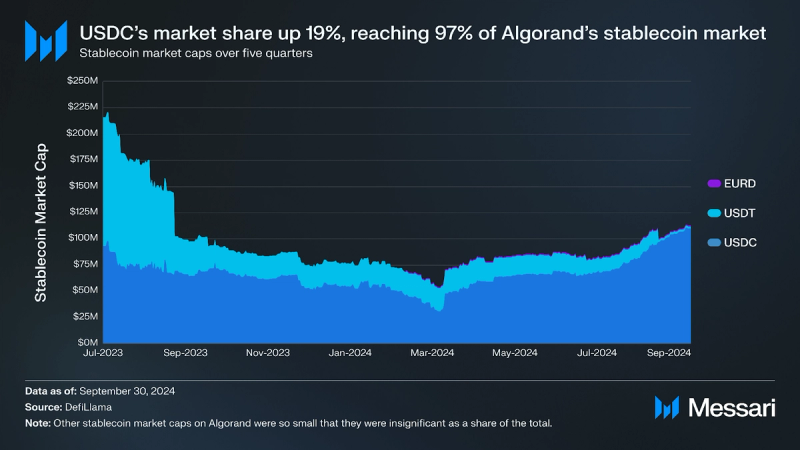
The market cap for stablecoins on Algorand rose by 34% QoQ, increasing from $85 million to $113 million. This growth was largely driven by a 66% increase in USDC’s market cap, which expanded from $66 million in Q2 to $110 million in Q3. Consequently, USDC’s share of Algorand’s stablecoin market rose by 19% QoQ, now representing 97% of the total stablecoin market cap on the network.
The increase in USDC’s market cap on Algorand can likely be attributed to enhanced integrations and partnerships that made USDC more accessible to users. Specifically, Algorand’s integration with Coinbase to enable USDC transactions and the Coinbase Learning Rewards program promoted USDC’s use on the network. These initiatives likely contributed to the rising demand for USDC.
In contrast, USDT’s market cap declined by 88%, making up only 2% of Algorand’s stablecoin market. EURD maintained a steady 1% share of the stablecoin market cap on Algorand.
DeFi
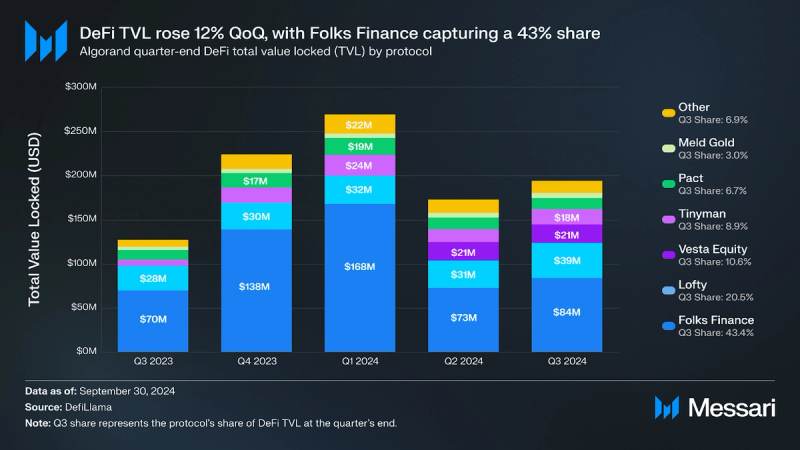
The total DeFi TVL (Total Value Locked) on Algorand grew by 12% QoQ, rising from $173 million to $194 million, largely due to increased activity on platforms like Folks Finance, Tinyman and Lofty. However, the average protocol TVL declined by 21%, decreasing from $88 million to $70 million. This contrast indicates that while certain protocols performed well and added to the overall TVL, smaller or emerging DeFi projects saw reduced engagement, potentially reflecting liquidity consolidation or shifts in user interest within the ecosystem.
To further illustrate, leading protocols by TVL, including Folks Finance, Lofty, and Tinyman, grew 16%, 27%, and 20% QoQ, respectively. In contrast, the “other” category – smaller DeFi protocols – saw an 11% decline in TVL, falling from $15 million to $13 million.
Targeted incentives – such as the 7 million ALGO designated to promote DeFi activity – may have influenced this trend. Allocations included 1.75 million ALGO for Folks Finance, 1.75 million for Tinyman, 1.5 million for Pact, 0.25 million for Cometa, and 0.25 million for Wormhole.
Additionally, the Coinbase Quest program contributed to user engagement with Tinyman and Folks Finance by introducing participants to key DeFi actions within Algorand. For example, the program encouraged using Tinyman to swap ALGO for USDC through the Pera Wallet, as well as engaging in Folks Finance by staking USDC in liquidity pools, affecting both the USDC market and DeFi TVL on the network.
Market Cap
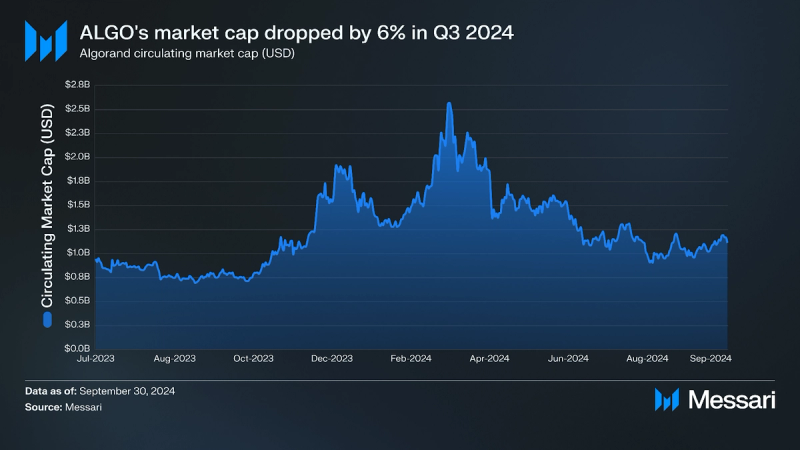
Algorand’s market cap decreased by 6% QoQ, from $1.2 billion to $1.1 billion, alongside a 7% drop in ALGO’s price, which fell to $0.13. During this period, the circulating supply saw a slight increase of 1%, rising from 8.2 billion to 8.3 billion tokens. Despite achieving a YoY market cap growth of 38%, Algorand’s market ranking declined slightly from 65 to 66 in Q3 2024, reflecting its relative stability within a fluctuating market landscape
Qualitative Analysis
Governance
The Algorand Foundation operates two governance programs: Community Governance and xGov. Community Governance runs quarterly, addressing key ecosystem decisions. The xGov pilot, which ran from Q2 2023 to Q1 2024, allowed participants to vote on fund allocations and strategic decisions. Unlike standard governance, xGov required participants to vote in each session or risk losing their staked ALGO, with forfeited stakes redistributed to those who completed the term. In Q3 2024, xGov transitioned to a public beta, updating eligibility criteria to link voting power to the number of blocks an address proposes, aligning participation more directly with consensus activities.
Although the Governance Period 11 (GP11) took place in Q2 2024, proposed measures had implications into Q3 2024. During this period, 16 key measures were addressed, with a total allocation of 26 million ALGO across various projects. Of this, 13 million ALGO (50%) went to DeFi Rewards: 7 million ALGO was directed toward Targeted DeFi Rewards, including 1.75 million to Folks Finance, 0.25 million to Cometa, 1.5 million to Pact, 1.75 million to Tinyman, and 0.25 million to Wormhole. The remaining 6 million ALGO supported general DeFi Rewards. Additionally, 0.6 million ALGO was allocated to NFT Rewards, including 160,000 ALGO for Gems to boost NFT trading and liquidity, while 10.6 million ALGO funded General Governance Rewards.
Governance Period 12 (GP12) took place in Q3 2024. During this period, 11 key initiatives were implemented, with a total of 22.5 million ALGO in rewards allocated. Half of this amount (11.25 million ALGO) went to general governance, while the remaining 11.25 million ALGO was directed to DeFi rewards. Within the DeFi rewards, up to 50% was designated for targeted DeFi projects, ensuring a minimum of 5.625 million ALGO for general DeFi rewards to foster decentralized decision-making across the Algorand ecosystem.
Targeted DeFi Rewards Allocation:
- Algomint: 206,491 ALGO to enhance liquidity in specific pools.
- AlgoRai: 165,795 ALGO for yield opportunities and educational programs.
- Cometa: 183,458 ALGO to drive cross-chain liquidity and users from Layer 2 chains.
- CompX Labs: 118,581 ALGO to increase TVL, transaction volume and attract new users.
- Folks Finance: 1,406,250 ALGO to attract users from other chains and raise TVL.
- Meld Gold: 131,925 ALGO for liquidity retention and brand awareness.
- Messina.one: 503,416 ALGO for cross-chain community engagement.
- Pact: 1,015,567 ALGO to increase liquidity and user numbers.
- Tinyman: 1,406,250 ALGO to enhance liquidity and trading volume.
- Wormhole: 120,124 ALGO to encourage asset bridging and liquidity growth.
Developments and Highlights
Technical Advancements
- AlgoKit Enhancements: Algorand released improvements to AlgoKit, including native binaries for Linux, Windows, and macOS. Offline compilation support and a new Transaction Wizard were added to facilitate easier transaction creation and visualization, offering developers a streamlined experience.
- FNet Launch: The launch of FNet, a public DevNet on Algorand, provides developers a dedicated environment to test Staking Rewards and other protocol implementations.
- Pera Wallet Updates: Pera Wallet launched Pera Discover V2, improving the ease of finding applications and enhancing user verification within the Algorand ecosystem.
- Consensus Incentivization: Algorand advanced its consensus incentivization efforts, aimed at rewarding consensus participants, with an expected launch by late 2024.
Partnerships and Ecosystem Initiatives
- Nigeria Initiatives: Algorand collaborated with the Plateau and Taraba States in Nigeria to explore blockchain uses in public services, including identity verification and healthcare. In Taraba, the Algorand Foundation held a six-day program to educate and train youth, fostering blockchain skills and adoption.
- World Chess Collaboration: Algorand renewed its partnership with World Chess, specifically focusing on technical support and marketing efforts for FIDE Online Arena, the digital platform for the chess community.
- Fintech Collaborations: Algorand collaborated with Archax to tokenize a money market fund and with ZTLment, a European payment institution, which migrated to Algorand to streamline cross-border payments for enterprises.
- Cosmic Champs Support: Algorand invested $25,000 for the mainnet launch of Cosmic Champs, a blockchain-based game, aiding its integration into the Google Play Store.
- Coinbase Learning Rewards Partnership: In September, Algorand collaborated with Coinbase on Learning Rewards (Coinbase Quests).
- Alchemy Pay Integration: Integration with Alchemy Pay enabled support for ALGO, USDC, and USDT transactions, simplifying fiat-to-crypto interactions and enhancing token utility.
- Cultural Preservation: In collaboration with DataMuseum, Algorand facilitated the creation of digital replicas of historical artifacts, demonstrating a use case for blockchain in preserving cultural assets beyond financial applications.
Key Announcements and Programs
- Sweden’s CBDC Evaluation: Sweden’s Riksbank included Algorand in trials for the e-Krona project, assessing its decentralized infrastructure and energy-efficient design as part of exploring a national digital currency.
- DeRec Alliance Membership: Algorand joined the Decentralized Recovery Alliance with projects like Hedera, Cardano, and Ripple, aiming to establish standardized asset recovery protocols across blockchains, improving security measures for lost or inaccessible digital assets.
- DIA’s Lumina Oracle Launch: DIA launched “Lumina”, a decentralized oracle on Algorand that uses zero-knowledge technology for data verification, designed to enhance secure data transmission within Web3 applications.
- LabTrace Partnership: Algorand collaborated with LabTrace to pilot blockchain in clinical trials, focusing on transparency and data security, marking its entrance into the healthcare sector.
Community and Developer engagement
- Developer Outreach: Algorand’s Developer Relations team ran global bootcamps and workshops, with notable appearances at events like WeAreDevelopers in Germany and Blockchain Summit Latam.
- Incubator Launch: Algorand launched an incubator program to assist early-stage blockchain projects, providing resources for team building, finding product-market fit, and scaling.
Closing Summary
The stablecoin market cap on Algorand increased 34% QoQ, led by a 66% rise in USDC, which now comprises 97% of Algorand’s stablecoin market. DeFi TVL grew 12%, with platforms like Folks Finance and Tinyman benefiting from targeted incentives, although smaller protocols saw reduced engagement.
Algorand’s Q3 network transaction fees dropped 58% QoQ to $64,000 due to reduced event-driven transactions, but YoY network transaction fees surged 638%, signaling long-term growth potential. Average daily transactions fell 55% to 2 million, while new addresses rose 63% QoQ, supported by partnerships and educational incentives like Coinbase’s Learning Rewards.
Governance updates included expanded community voting options and targeted rewards, with 26 million ALGO allocated to DeFi and general incentives. Technical updates, including AlgoKit enhancements and the FNet DevNet, were paired with partnerships in fintech, gaming, and public sector blockchain applications.

